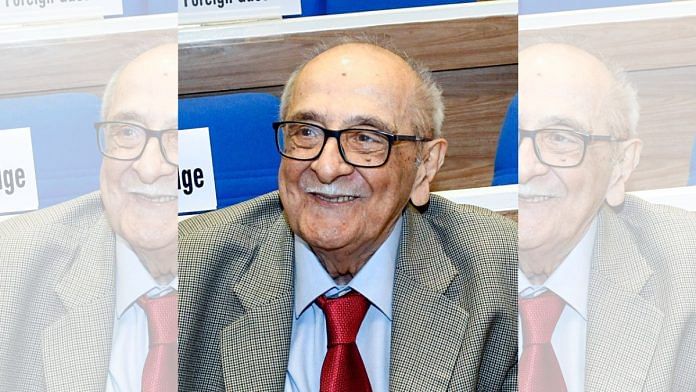Tragedies and victories are times when cliches seem fair game. The death of Supreme Court advocate Fali Nariman is just such a tragedy. No doubt, the papers must already be full of praises and accolades to him. However, I cannot help adding to the list and calling him a colossus of the Indian Bar whose passing has left us all the poorer. This is not only because of the number of cases of great constitutional importance that he argued in his lifetime – many lawyers have done so in the past without commanding the respect that Nariman did. He had something more, a mix of courage and the desire to uphold the values and traditions of the Bar.
Born in 1929 in Rangoon (now Yangon), Myanmar, Nariman moved to Bombay (now Mumbai) and studied law at the Government Law College, an institution that produced some of the greatest legal luminaries of his time. Over time he made a name for himself at the Bombay Bar and eventually moved to Delhi after being appointed as the Additional Solicitor General of India. He had been promised to be ‘promoted’ and appointed as the solicitor general by the Law Minister HR Gokhale. However, fate intervened and after the decision of the Allahabad High Court to set aside the election of Prime Minister Indira Gandhi, a state of internal Emergency was imposed. Rather than meekly accept the promotion that was soon to come his way, Nariman displayed his courage of conviction and resigned the very next day after the Emergency was declared.
It is this commitment to freedom and justice that caused him to lock horns not only with the Congress government at the height of its power, but also with any powerful government since then. He also did not hesitate in criticising the Supreme Court when he felt it was necessary to, most recently for its judgment upholding the repeal of Article 370. Many other lawyers have had the seniority to be able to criticise the court, but very few do for fear of upsetting judges before whom they argue cases daily. To Nariman, this was of no importance. This is what courage really is, arguing for what is right regardless of the consequences for oneself.
Also Read: SC verdict on Article 370 settles J&K question. But it dilutes powers of states
A lesson learnt
On a more personal note, I remember Fali Nariman not only as a friend of my father and as a father of my friend (Justice RF Nariman), but as a consummate lawyer who had much to teach any young person beginning their legal career. Many years ago, I had gone to brief the well-known and equally well-feared Fali S Nariman in his Hauz Khas Enclave office. The meeting began and Nariman was reading the papers intently. He looked up and asked a question that none of the team of lawyers had thought about. I jumped up with all the youthful exuberance, and not a little amount of arrogance, and gave an answer that could not possibly have been entirely correct. Without flinching and barely looking up from the file he was engrossed in, he proceeded to tell me to read the file properly and to come back with the right answer. This was not so much admonition as it was training. In law, it always pays to be plodding and right rather than quick and possibly wrong. This was a lesson that I learned and it is one that has stood me in good stead over the decades that I have been practicing law.
While not all lawyers may have had the privilege of briefing Nariman and learning from him, he was a prolific writer. Any lawyer or student would be well advised to read one of his books and learn from his vast experience as a lawyer. For instance, in his autobiography, Nariman has listed a set of dos and don’ts for lawyers. The one that stands out is “Let your opinions be honest and responsible. Never begin a suit or an action unless you are satisfied that your client has evidence to substantiate his claim in a Court of law”. It is a sad testimony of our times that this rather obvious principle, one that helps to maintain the majesty of the law, has to be spelt out in such clear terms. Perhaps we would do well to remember another ‘do’ that Nariman listed in his book which states that “lessons in advocacy are often imbibed from the great and successful.” We have a lot to learn from Fali Nariman, who was not only great and successful, but also courageous and honest. His departure at a time when we could all do some reminding of the values that he espoused is sad, but I hope the lessons he hoped to teach us will endure through the words of his books and the memories of his deeds.
Saurabh Kirpal is an Indian lawyer, author and a senior advocate at the Delhi High Court. Views are personal.
(Edited by Theres Sudeep)



